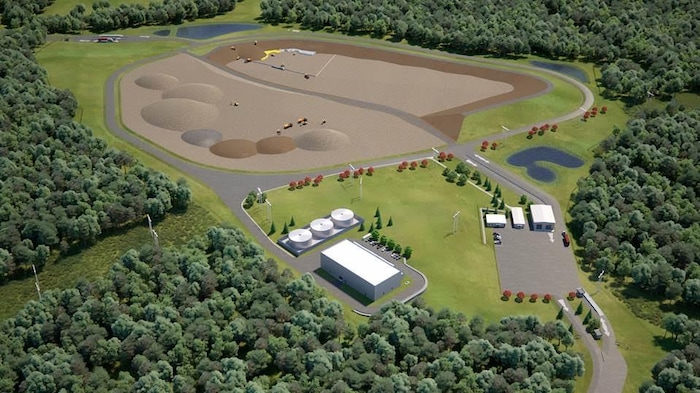Open in full screen mode In January, the Canadian Nuclear Safety Commission authorized the development of a proposed nuclear waste burial site in Chalk River. (Archive photo) Voice synthesis, based on artificial intelligence, allows to generate a spoken text from a written text. The authorization to build a nuclear waste management facility in Chalk River, northwest of Ottawa, worries three citizen groups and the Kebaowek First Nation. Some fear the impact of radioactive waste on the environment; others claim not to have been consulted. They are therefore requesting a judicial review of this decision. The Canadian Nuclear Safety Commission (CNSC) has authorized the completion of the Canadian Nuclear Laboratories project, located 1 km from the Ottawa River, on January 9. In its decision, the CNSC explains that the private company will be able to store up to 1 million cubic meters of low-level solid radioactive waste, such as personal protective equipment and contaminated construction materials. < source srcset="https://images.radio-canada.ca/q_auto,w_635/v1/ici-premiere/16x9/dezo-dechets-nucleaires-chalk-river-64849.jpg" media="(min-width: 0px) and (max-width: 1239px)"> Why is the Chalk River project controversial? According to the CNSC, the proposed near-surface waste management site is not likely to cause significant environmental effects. She adds that its design is robust and is backed by a solid safety record. For three groups of citizens and for the Kebaowek First Nation, this decision by the CNSC is unreasonable. They are turning to the Federal Court for judicial review. A group of “concerned” citizens of Renfrew County and surrounding areas (under the name Concerned Citizens of Renfrew County and Area in English), the Rally Against Radioactive Pollution and the Regroupment for Nuclear Surveillance argue that radiation doses waste will exceed Canadian standards in this area by at least one and a half times. Loading in progress ELSEWHERE ON NEWS: Federal dental care plan: tensions between Quebec dentists and Ottawa Canadian Nuclear Laboratories have not been transparent about what will be stored in the landfill site, claims the lawyer representing the plaintiffs, Nicholas Pope. In total, 165 interveners were heard by the CNSC during a public hearing in February 2022. Some raised concerns regarding the levels of waste radiation. Physicist and spokesperson for the Rally Against Radioactive Pollution, Ginette Charbonneau estimates that this nuclear dump has a useful life of 550 years, while the majority of waste will last thousands and millions of years. In their request for review, the groups also allege that the Commission did not take into account the cumulative effect of radioactive waste. A lot of waste from nuclear power plants in Canada is imported into Chalk River […]. Radiation is accumulating, says Ginette Charbonneau. Chalk River landfill site: “It’s a battle that is about to begin”. BROADCAST HERE FIRST.Golden mornings. Listen to the audio (Chalk River Landfill  ;: “It’s a battle that is about to begin”. 8 minutes 41 seconds) In a separate request for judicial review, the Kebaowek First Nation claims that it was not adequately consulted. The Commission would not have not conducted a fair consultation process in addition to not having obtained the free, prior and informed consent of Kebaowek, indicates the request from this First Nation. Sharing information, presentations, that’s one thing. But when we look at it from the angle of consent, it's not enough, deplores a member of the band council of the Kebaowek First Nation, Justin Roy. The Kebaowek First Nation is contesting the decision of the Canadian Nuclear Safety Commission. (Archive photo) This request states that the CNSC's decision would contravene Canada's obligations, which recognizes the Canadian law interpretation of the United Nations Declaration on the Rights of Indigenous Peoples. Justin Roy clarifies that the Kebaowek First Nation is not anti-development [nor] anti-nuclear but that he does not want [his] territory to become a nuclear dump without a proper consultation. Canadian Nuclear Laboratories declare, in writing, that they are analyzing the legal proceedings filed. They say they continue to ensure the safe management of past waste and waste generated by current and future activities. We remain fully committed to building meaningful relationships through continued engagement with Indigenous communities as part of Canada's reconciliation process, they write. Questioned about the ongoing legal proceedings, the CNSC indicated in writing that it was determined to continue [its] mobilization and consultation activities with Indigenous Nations and communities, interested parties and the public. At the time of publication, the Office of the Attorney General of Canada had not yet responded to our request for comment. With information from Nelly Alberola and Audrey Neveu
Federal dental care plan: tensions between Quebec dentists and Ottawa
Chalk River Landfill: “It's a battle that's about to begin”
SHOW HERE PREMIEREMornings in Gold
Chalk River: Groups want judicial review

